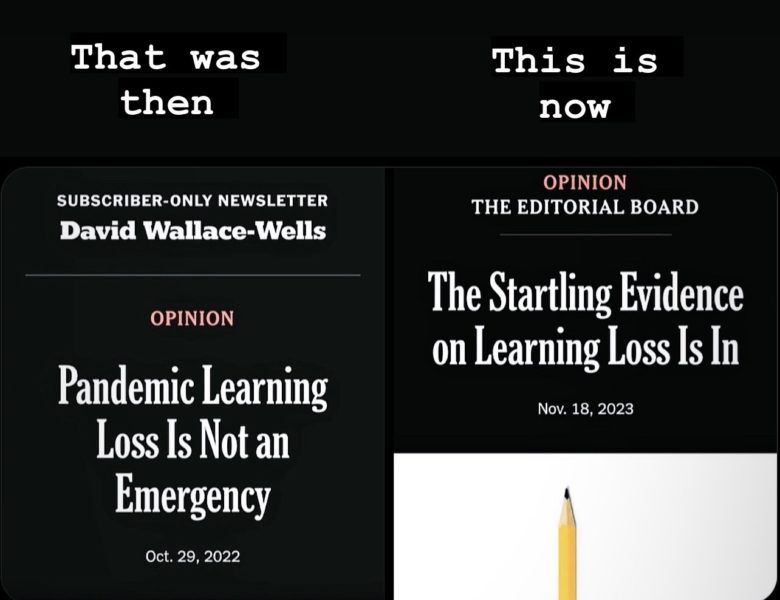
This is part of a series on intelligence and the decline of society. See this index.
In part 1 of this series, I introduced the topic of intelligence and its impact on the economy and education in particular. In part 2 I explain why the post-covid decline in student achievement was the result of misguided covid responses, rather than cognitive damage from covid itself. In this part, I discuss further objections and comments on this topic.
Failing to Teach
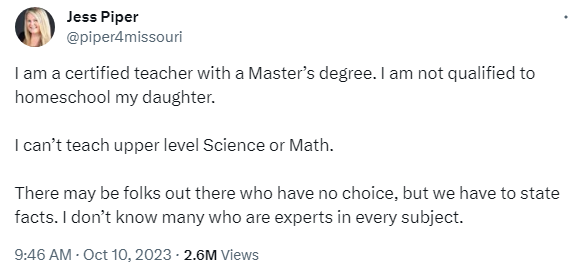
As we discussed in part 2, Jess Piper is probably a good example of one of the underqualified ~90% of teachers who are only teachers because there are not enough qualified teachers available. She probably has a Masters due to grade inflation and lowered standards, but by her own admission she is unqualified even to teach at the high school level, let alone homeschool her own children. This is not atypical for an average persona (IQ around 95-105).
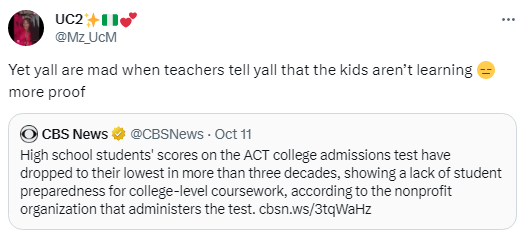
The teachers can see that there is a problem, they can see that the kids are not learning, but they cannot even comprehend how to fix the problem. They are unable to, because we’ve stuffed our schools with teachers who are not qualified and administrators who cannot lead. We didn’t have any choice, but that doesn’t make the effects any less real.
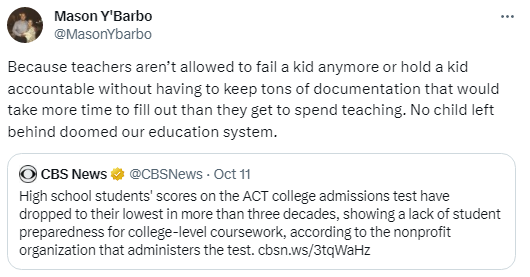
We do have a choice with what to do with underperforming children. But, the system forbids the very thing that was necessary to stop the fall in test scores and repair it. Now we have to wait for it to happen naturally, as older, damaged kids are slowly replaced by younger kids. Of course, the system isn’t going to do the younger kids any favors either.
And of course there is never going to be any accountability for those who were responsible for the learning loss.
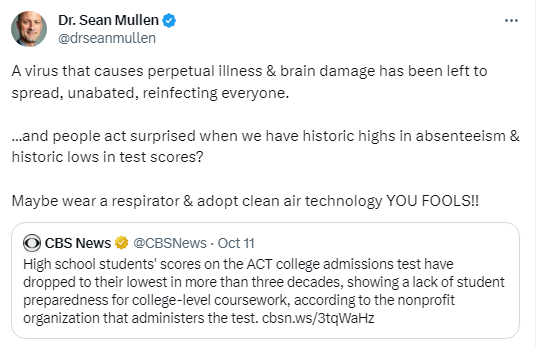
Wait, “historic highs in absenteeism”? Missing school is a first-order cause of poor test scores. That’s the point of this argument: if you miss in-person classes, your scores go down. Blaming missed school on cognitive damage is some real cognitive dissonance. Absenteeism constitutes direct causation of continuing falling test scores: if you skip school, you will lose learning opportunities. To then call everyone fools for not wearing a mask and filtering air—at best indirect causes—is the height of religious zealotry. So when the Doctor says “wear a mask”—which will further reduce ELA scores—perhaps he is suffering from brain damage and we should just ignore what he has to say.
Blankslatism and Racism
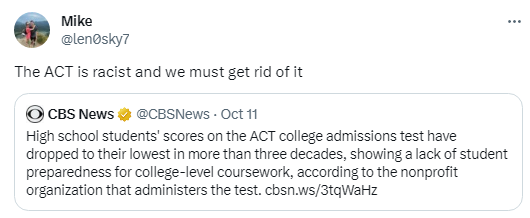
As discussed in part 1, blankslatists cannot conceive of a world where people have different outcomes because of physical differences caused by their genetics, or as the common internet aphorism goes “evolution ends at the neck.”They can only blame racism, like spending too much education dollars on White kids and not enough on Black kids.
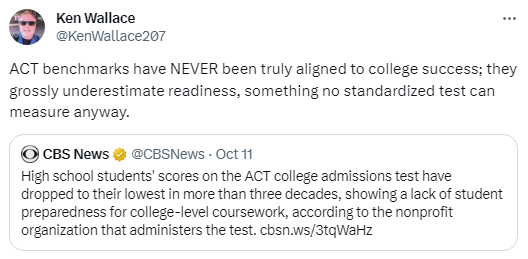
The ACT is a good proxy for IQ on a relative level. Higher ACT scores indicate higher IQ and do in fact predict higher relative college readiness. But, on an absolute level—a particular ACT score is not as good of an indicator of IQ or achievement or college readiness. This is easily shown in the falling ACT scores and rising IQs that we saw in part 2. Relative scores are more important than absolute scores when comparing different measures (e.g. IQ, SAT, ACT):
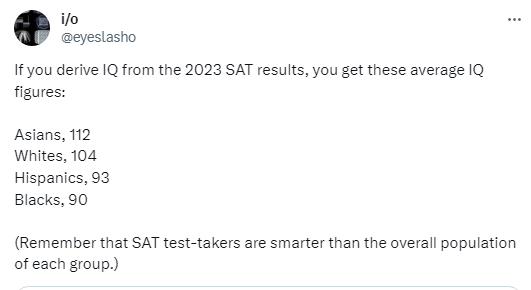
We don’t need ACT scores to measure absolute college readiness, we only need them to show relative college readiness and then have colleges and universities only select the highest scores. But colleges and universities do not want students who are ready for college, they want diversity and so refuse to use standardized tests.
This is why race—the most important proxy for IQ—has an overwhelmingly strong descriptive impact on achievement scores. At the population level, race more-or-less describes achievement while IQ more-or-less prescribes/predicts it.
In terms of achievement—actual performance—IQ tests measure ability/potential for achievement, while the SAT and ACT measure skills/achievement directly. SAT/ACT scores are lagging IQ scores because students missed too much school and are not taught properly.
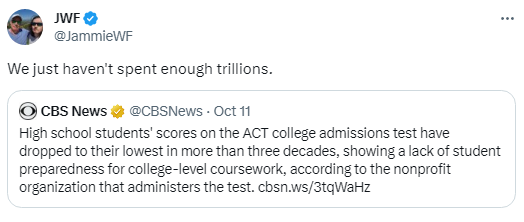
The sarcasm reveals something important. The people who think covid is responsible for falling test scores also think that spending more money can fix the problem, despite decades of evidence to the contrary. This is a direct result of blankslatism: if bad results are due exclusively to the environment, then all you should have to do is change the environment to fix the problem. As we discussed in part 2, the massive massive spending in Baltimore and Washington DC has not succeeded in graduating even a single student proficient in both math and reading from multiple entire schools! No amount of evidence that it isn’t about racism can overcome these deep seated religious beliefs. Even though this has never worked in the decades it has been attempted, they never stop trying.
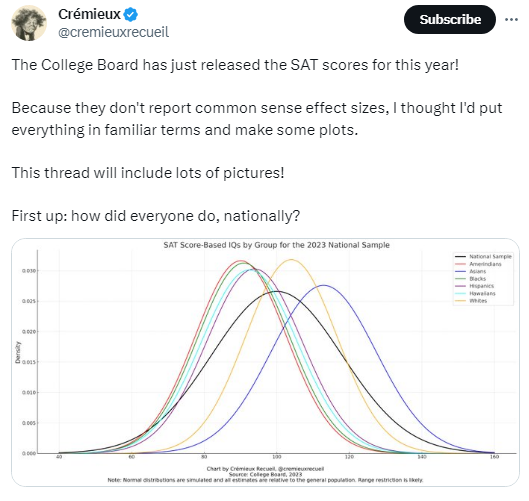
Despite years and years, decades and decades, the Asian/White/Hispanic/Black racial achievement gaps will not close. They cannot close, because those gaps are real. Blankslatists deny the reality of those gaps because they are racist. Apparently, reality is racist.
Long-Covid
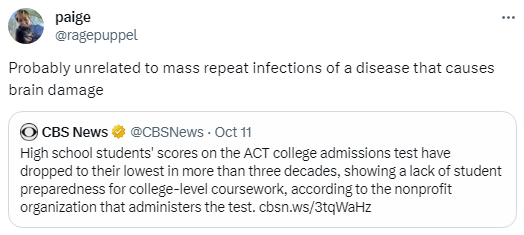
Not all sarcasm is helpful. This is why I cited the IQ stats. Brain damage would show up in IQ results, and moreover because it would affect everyone (not just students), its effects should be stronger in IQ tests taken by adults, rather than grade-school achievement, because Long Covid—like Covid itself—is stronger in adults.
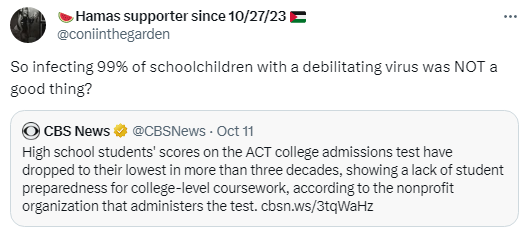
Notice the active language used here: “infecting 99% of schoolchildren.” There was no way to prevent everyone from (passively) getting covid. The only ones who (actively) infected 99% of children are the people who created it in the lab, but there will never be any accountability for this.
As an aside, tt is also worth noting that scoring deviations in the ACT can have multivariate causes. Simplistically blaming it on Long Covid is not very smart, especially with the falsification challenges already discussed.
Fixing Schools

The United States Military requires an IQ-equivalent of 92 or higher (although standards have been falling and will continue to do so). This means that the average IQ of a member of the military is somewhere between 105 and 110. Since IQ is ~80% heritable, a school that is only for the families of military members is likely to be in a similar range. It turns out that the way to fix failing schools is to only include students who have an IQ of 90 or higher. Problem solved.
This is, of course, why private schools tend to do so much better than public schools: they have better students. If you want to fix failing schools, you have a variety of strategies, including:
(1) Separate schools containing different IQ tiers. This will never be allowed because it would be de-facto racial segregation. This is unfortunate, because being able to tailor education to a narrow IQ range would allow education of higher IQ kids to proceed more rapidly, maximizing what they learn and minimizing how much time they have to spend in school. Of course the best teachers would go to the best schools, further widening the achievement gap. This is only further proof that there are not enough good teachers.
(2) Graduate kids with lower IQs as soon as they hit the expected achievement thresholds. This is hard for most people to hear—especially blankslatists—but once a child learns as much as they can for their IQ, school just becomes a taxpayer-funded daycare. A number of cities—like Baltimore and Chicago—would be better off simply closing many of their high schools and not replacing them. Of course in the U.S., the law mandates schooling until age 18, so this solution is legally impossible without legislative changes.
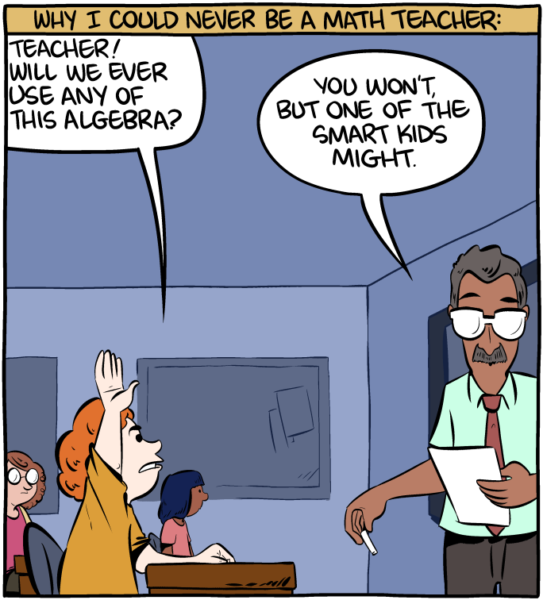
Kids with an IQ at or below ~85—around 16% of Whites and 50% of Blacks—will not be able to to achieve NAEP Basic reading achievement. Sending kids to school once they have achieved their potential has no educational purpose, and it only serves to demoralize them. Once a student reaches their threshold of expected achievement, school should become optional. Alternatively, use this time for more in-depth vocational training, assuming that training takes IQ level into consideration (which, you know, it won’t).
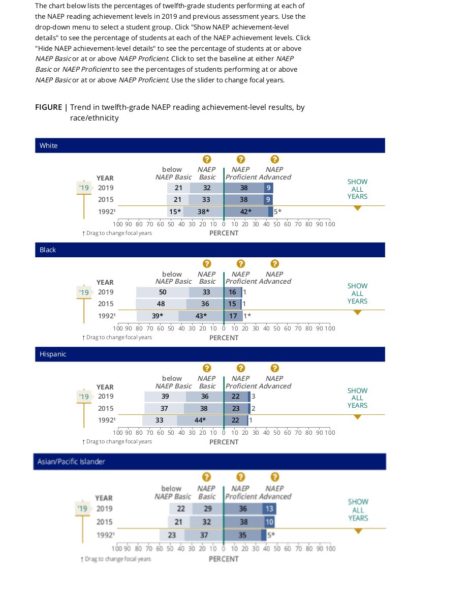
(3) Stop sending so many people to college. It is a vast waste of money. For many jobs and profesions, students below ~110 IQ should be encouraged to enter the workforce immediately or transition into a trade that does not require a degree. For most, college degree requirements should be replaced with certifications and on-the-job training. A fully fleshed out liberal arts education is simply not cost effective for the majority of people.
High school job counselors should list various jobs by IQ tier and advise people to enter the area that best suits their abilities. Just as you don’t encourage a 5’2″ kid to try for the basketball scholarship, you don’t want the 90 IQ kid trying to become a bridge engineer or a brain surgeon, even if they can somehow manage to graduate. Guidance counselors should not encourage kids to “shoot for the stars.”
As you can see, fixing schools is politically implausible. Enjoy the decline.

I agree with the last portion in particular.
Some other countries (I’m told) have different tracks depending on the student and their future prospective profession. For pupils who will go into trade professions there is a track that starts the training in high school.
Per DOD schools, I can’t read the NYT article but there are very very few remaining DOD schools in the CONUS. Something like 17 total locations (maybe 30k students, tops, I would guess). Which is unfortunate because they were very good compared to the outside communities in my experience. Part of that was parenting (more discipline, higher level of involvement), part was the teachers (usually DOD jobs are coveted and the teachers experienced), and some of it was location. Military move a LOT, so if a family moved from a very good school area to a bad one, they would seem like geniuses at the new location. Moving the other way had the opposite effect. I’ve known a lot of military kids who lost their way when they moved from a terrible school location (like Hawaii) to a very good one like the northeast.
This changed lives, literally. A lot of behavior issues tend to follow when a child is convinced they are stupid because they didn’t have the same background…and that can follow them their entire lives. The opposite is true as well (when our boys moved from Virginia to N Mexico they excelled because it was mostly a repeat of what they had already done…in fact, this was pretty standard in N Mexico and the school board attempted to shut down that DOD school for that reason…to spread out all the children from better areas of the country who would excel on those aptitude tests and make the community overall look better).
Everyone’s situation is unique to them but I think most successful people had someone in their life who made a big difference. I know I’ve had a couple of teachers that changed everything for me, and Mike did the same (we studied together for physics class, when I learned physics was not as hard as I thought….and I did very well, whereas without him I would have thought it was impossible and probably failed).
With respect to parenting, the direction of causation goes from IQ to parenting. Good parenting, including good discipline and other environmental factors, largely happen because higher IQ parents are able to adapt to those problems better. Without IQ, those things wouldn’t happen.
This is not a reciprocal arrangement: it is possible for anyone to be a bad parent, a *really* bad parent, even with a high IQ. But, being a good parent generally requires a relatively high IQ. Not astronomical, because acceptable parenting isn’t as hard as people say it is, just not in the lowest percentiles. This, incidentally, reflects your observation that it’s easy to mess a kid up if you put him in the worst environment and hard to fix him once broken.
Different discipline is required for different IQ. What works for a high IQ kid will not necessarily work for a low IQ kid (and vice versa). Usually this goes unnoticed, but if you’ve adopted a child with an IQ different from yourself, you have to adapt your parenting techniques to compensate. Biological parents and children don’t even think about this stuff.
It’s also worth noting, that special needs IQ is separate from neurotypical IQ. They are on a bimodal distribution and should not be directly compared. My posts and comments mostly pertain to neurotypical persons.
Yes, this is important to stress: averages do not determine what will happen to any particular individuals, they only predict what is most likely. This is why what they give is supposed to be guidance, not commands.